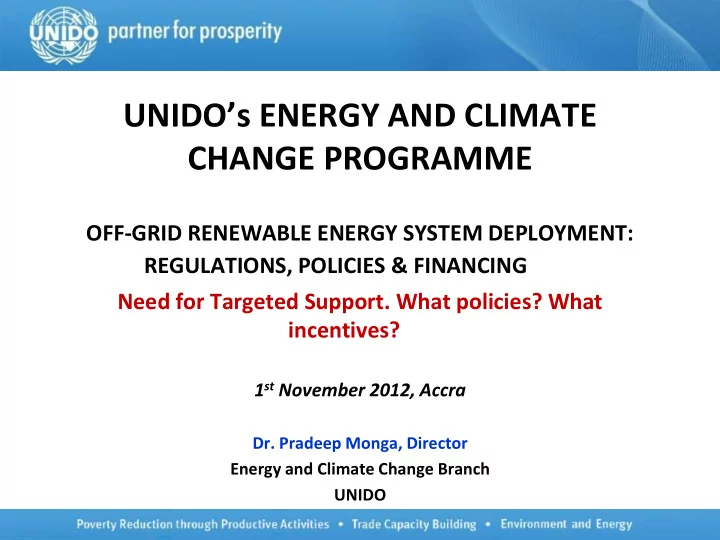

UNIDO’s ENERGY AND CLIMATE CHANGE PROGRAMME OFF-GRID RENEWABLE ENERGY SYSTEM DEPLOYMENT: REGULATIONS, POLICIES & FINANCING Need for Targeted Support. What policies? What incentives? 1 st November 2012, Accra Dr. Pradeep Monga, Director Energy and Climate Change Branch UNIDO
CONTENTS UNIDO’S Mandate Off-Grid RE Deployment Need for Targeted Policies and Incentives Relevant UNIDO projects 2
UNIDO’s Energy and Climate Change Programme Providing Integrated Energy Solutions and Services for promoting the Sustainable Industrial Agenda: GREEN INDUSTRY STRATEGIC FOCUS -Enhance access to modern energy services for productive uses -Increase the competitiveness of industries by reducing their dependence on fossil fuels -Reduce emissions of industries by promoting energy efficiency and renewable energy
UNIDO’s Energy and Climate Change Programme THEMATIC FOCUS Industrial Energy Efficiency (Energy Management Standards, ISO 50001 and Systems Optimization) Renewable Energy for Productive Uses (mini-grids, 0ff-grid applications and industrial use Low Carbon, Low Emissions Technologies (Hydrogen and CCS)
UNIDO’s Renewable and Rural Energy Programme STRATEGIC FOCUS - Scale up Renewable Energy Technologies and Markets – solar, small hydropower, wind, biomass and geothermal - Promote Renewable Energy in Off-grid for Access - Mini-grids for Productive Uses - Promote Renewable Energy for Industrial Applications (Heating and Cooling)
OFF GRID RE DEPLOYMENT – MINI GRIDS Building Blocks TARGETED PUBLIC POLICIES INVESTMENTS FOCUSED PRIVATE INTEGRATED RISKS Results and Impacts OPERATIONAL INCOME MAINTENANCE GENEARATION INSTITUTIONAL PRODUCTIVE USES ACTIVITIES CAPACITIES FRAMEWORK 6
TARGTED POLICIES FOR OFF-GRID RE DEPLOYMENT ENSURING A LEVEL PLAYING FIELD MITIGATING INVESTMENT RISKS PROMOTING INNOVATIONS BUSINESS MODEL APPROACH LINKING TO PRODUCTIVE USES PRICING / TARIFF SIGNALS Module 1
RIGHT INCENTIVES – FEW EXAMPLES GRANTS (to mitigate risks) TAX INCENTIVES SMART SUBSIDIES REVOLVING FUNDS NON GRANTS INSTRUMENTS Module 1
Case Study: Renewable Energy based electricity generation for isolated mini-grids in Zambia Location of Minigrid The project aims at promoting Sites in Zambia Off-Grid RE Deployment: Biomass gasifier power plant for 500 kW of electricity generation Small hydropower station to generate 1 MW of electricity Solar energy mini-grid with an output of 36 kW Total project budget: US$ 10 MILLION
Smart Micro Grid linking to Productive Uses in Kenya 10
Design and Structure of Smart Micro Grid Business Model Micro Smart Grids 25 kW + Management Operation and structure maintenance Energy Services Productive Use 10 kW 15 kW ICT Primary processing of Recharge Community Other rural agricultural products Services mobiles, services productive uses LED lamps, - medicine refrigerated storage Car -TV and entertainment batteries Secondary processing of agricultural products into food 11
UNIDO’s Off Grid Renewable Energy Projects in West Africa 7 Off-grid renewable energy projects (under implementation) RE Mini-grids linking to Productive Uses Countries – Sierra Leone, Liberia, Nigeria, The Gambia, Guinea, Chad, Cote d’Ivoire Targeted RE Policies and Incentives (under design / strengthening) 12
UNIDO’s Off Grid Renewable Energy Projects in West Africa- Regional RE Policy Key Features Share of renewable energy (incl. large hydro) in the total electricity to be increased from 32% in 2010 to 35% in 2020 and 48% by 2030. Share of new renewable energy such as wind, solar, small scale hydro and bioelectricity (excl. large hydro) from non existence in 2010 will increase to around 10% in 2020 and 19% by 2030. These targets translate into an additional 2.425 MW renewable electricity capacity by 2020 and 7.606 MW by 2030. Around 75% of the rural population to be served through grid extensions and around 25% by renewable energy powered by mini- grids and stand-alone hybrid RE systems by 2030. 13
THANK YOU! Pradeep Monga Director Energy and Climate Change p.monga@unido.org www.unido.org/energy
Recommend
More recommend